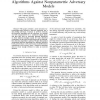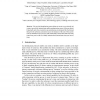107 search results - page 1 / 22 » When Random Play is Optimal Against an Adversary |
COLT
2008
Springer
13 years 7 months ago
2008
Springer
We analyze a sequential game between a Gambler and a Casino. The Gambler allocates bets from a limited budget over a fixed menu of gambling events that are offered at equal time i...
CORR
2011
Springer
13 years 6 days ago
2011
Springer
In this paper, we study the average case complexity of the Unique Games problem. We propose a natural semi-random model, in which a unique game instance is generated in several st...
CISS
2007
IEEE
13 years 11 months ago
2007
IEEE
Abstract—This paper presents a novel zero-sum watermarking game between a detection algorithm and a data hiding adversary. Contrary to previous research, the detection algorithm ...
EUROCRYPT
2001
Springer
13 years 9 months ago
2001
Springer
Abstract. We provide identi£cation protocols that are secure even when the adversary can reset the internal state and/or randomization source of the user identifying itself, and w...
COLT
2010
Springer
13 years 3 months ago
2010
Springer
We study the regret of an online learner playing a multi-round game in a Banach space B against an adversary that plays a convex function at each round. We characterize the minima...


